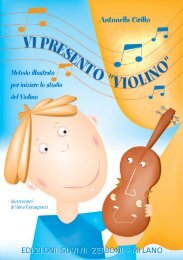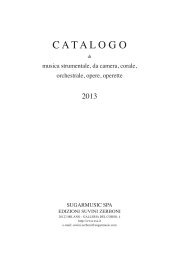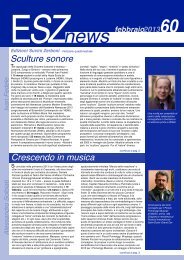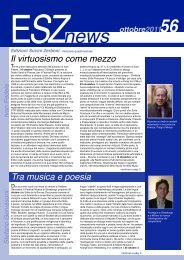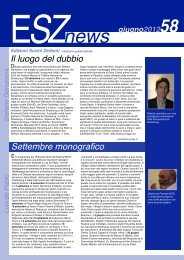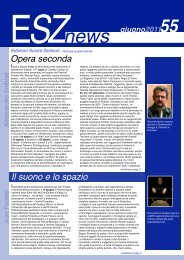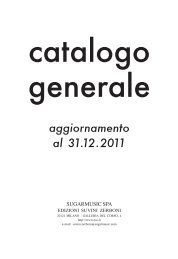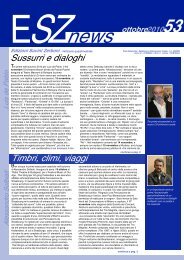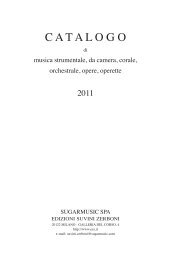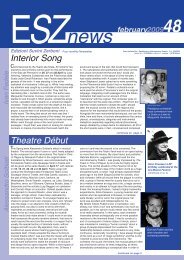Timbral Spaces Sound Labyrinths - Edizioni Suvini Zerboni
Timbral Spaces Sound Labyrinths - Edizioni Suvini Zerboni
Timbral Spaces Sound Labyrinths - Edizioni Suvini Zerboni
Create successful ePaper yourself
Turn your PDF publications into a flip-book with our unique Google optimized e-Paper software.
Stefano Gervasoni<br />
Invitation au voyage<br />
T<br />
his Autumn opens with a chamber premiere for Stefano<br />
Gervasoni: on October 25 the Incontri di Musica<br />
Contemporanea of the Festival Pontino will include, in the<br />
Palazzo della Cultura in Latina, Folia (Omaggio a Aldo<br />
Clementi) for violin, played by Lina Uinskyte, during a<br />
concert dedicated to the memory of Clementi. The<br />
composer introduces his new work as «a spiral wandering<br />
with an assured return home (therefore, a wandering<br />
without adventure), but a home that is always a little<br />
foreign (never completely felt as one’s “own”). A<br />
wandering that is “domestic” and ambiguous at the same<br />
time, in which the possibility of discovery – typical, and<br />
declared, of the adventure trip – is not excluded, but is<br />
reserved for the usual objects of a usual wandering, to<br />
which, with the surprise of a rediscovery or the<br />
deciphering of an enigma ever to be unveiled, the<br />
curiosity of the traveller is subjected. A traveller who is not<br />
adventurous but alert. In a play of repetitions, variants,<br />
micro structural development of an initial cell and of<br />
appearances of new elements to broaden the “walking<br />
radius” of the wayfaring composer, like that of two objects<br />
crystallized around the notes A and C that become<br />
increasingly more important, almost as if being<br />
transformed into a person encountered on a walk and in a<br />
moment of dialogue with her. A typical situation of<br />
pilgrimage or climbing a mountain, in which history or<br />
nature break off from everyday reality and allow us to<br />
build a deep relationship with a fellow traveller<br />
encountered momentarily perhaps by chance and that<br />
one is certain to meet again». After its first performance<br />
last September at the Festival Musica in Strasbourg on<br />
commission of Les Percussions de Strasbourg, the opera<br />
Limbus-Limbo, “apéro bouffe” in seven scenes for six<br />
percussionists, three soloists, three singers, three actors<br />
and live electronics, on a libretto by Patrick Hahn and<br />
directed by Ingrid von Wantoch Rekowski, now goes on<br />
tour. It can be seen on November 29 in Vernon, during<br />
the Automne en Normandie, on December 3 and 4 in<br />
Paris, at the Opéra Comique, and on December 15 at the<br />
Opéra de Reims during the festival Scène d’Europe.<br />
It will be performed by Juliet Fraser (Tina), soprano,<br />
Christopher Field (Bruno), countertenor, Gareth John<br />
(Carl), baritone, Corinne Frimas, Luc Schillinger and<br />
Charles Zevaco, actors, Olivier Darbellay, horn and alpine<br />
horn, Antonio Politano, flutes, Luigi Gaggero, cymbalom,<br />
Les Percussions de Strasbourg and Carmine Emanuele<br />
Cella, computer music designer and live electronics.<br />
On December 16 the series Ex Novo Musica in the Sale<br />
Apollinee of the Gran Teatro La Fenice, will include an<br />
evening entitled “Wanderung mit Stefano Gervasoni”. The<br />
violinist Lina Uinskyte and the pianist Aldo Orvieto play in<br />
a concert that features – with deliberate symmetry – three<br />
instrumental works by Stefano Gervasoni: the very recent<br />
Folia for violin, a triptych of piano pieces (Précieux for toy<br />
piano, Pré paré and Pré épuré, the latter two in their first<br />
performance) from the series Prés, work in progress,<br />
begun in 2008 that is now enriched by two new pieces,<br />
and the very recent Sonatinexpressive for violin and<br />
piano, commissioned by Ex Novo Musica 2012, this<br />
too in its first performance. The theme of the evening<br />
represents an invitation to move, to wander, to travel the<br />
way together. In a famous interview, the Hungarian<br />
composer György Ligeti, one of the important points of<br />
reference for Gervasoni, affirmed with an exemplary<br />
sense of irony that, if they really wanted to name a street<br />
in Budapest after him, it should be called: “wrong way<br />
street György Ligeti”. One of the recurring themes in the<br />
music of Gervasoni is precisely the idea of a “street”<br />
taken in a problematic sense: the “strada non presa” (“the<br />
street not taken”) (which is also a title of a work of his<br />
from 2001) or the street that “has nothing in front of it”.<br />
«The street», Gervasoni observes, «is also a labyrinth<br />
and proceeding without any goal: a metaphor of our times<br />
that is reflected in art with the collapse of aestheticideological<br />
paradigms». As far as his new works are<br />
concerned, Gervasoni describes his project for a book of<br />
Prés as being «divided into groups of three pieces (from<br />
one to three pages), thematically and/or musically related.<br />
Pré paré and Pré épuré, which should be separated by a<br />
Pré carré, constitute another of the triptychs of the<br />
second book. Pré paré (embellished meadow) and Pré<br />
épuré (denuded, treated, cleaned meadow) represent two<br />
antithetic and complementary views of the meadow taken<br />
metaphorically. One in which the grass species live<br />
together unchecked (by man) with other wild species, in a<br />
regime of luxurious happiness, anarchic or democratically<br />
natural (green as an image of multiple unity). The other, in<br />
which the hand of man has left its mark: in the selection<br />
of the grass species, reduced to one, and in the care of<br />
the surfaces, perfectly regular, uniform and monochrome,<br />
on the one hand; or in its impoverishment: the<br />
artificialization of the meadow, reduced to urban decor,<br />
until becoming arid due to drought (a “natural” meadow<br />
finds it increasingly difficult to survive by itself), dramatic<br />
evidence of climate change in which humans are certainly<br />
not without responsibility. In any case, an unhappy<br />
meadow, neither anarchic nor democratic. An image of<br />
externally imposed unity, depriving the green of its natural<br />
and joyful complexity». Regarding Sonatinexpressive<br />
(Inexpressive sonata – Expressive sonatina?), Gervasoni<br />
tells us: «The architectural development of the Sonata<br />
that sterilizes or dominates the expressive impulse of the<br />
small form; the intimacy of the album leaf, the most<br />
recurrent confession – and the desire to share it – for the<br />
impromptu, the romanza, the prelude; the strength or<br />
fragility of the emotions or the need for consolation in the<br />
intermezzo, the berceuse, the nocturne... Or else the<br />
fullness of emotion and elusiveness of the grammars that<br />
move the imagination and are inscribed in the charm and<br />
the discretion of a Sonatina? To allow oneself to “say”,<br />
but only microscopically, as from behind a veil, muted, so<br />
that the temptation to express and lyricize are not<br />
absolved but only averted, made to live alongside the<br />
desire to hold them back, to protect them, to allow them<br />
to renew themselves with even greater force. An<br />
indomitable force, not possible to crystallize, to sterilize<br />
into forms and manners that would show them in full,<br />
openly, reducing them for ever into discourse, emblem,<br />
surrogate of an active listening, for ever, which that force<br />
must each time seek out and rediscover... The dilemma,<br />
evoked by the title chosen for this piece, remains<br />
deliberately unresolved...». At the beginning of the new<br />
year Geneva will be a vital centre for the music of<br />
Gervasoni. The centenary of the Comédie de Genève will<br />
be celebrated with a series entitled “Constellation<br />
Musique Autour de 1913”, which interprets the year of<br />
foundation of the institution as a year emblematic of the<br />
start of modernity in all the arts, which in the field of music<br />
coincides with the historical premieres of the Sacre du<br />
Printemps and Schoenberg’s Pierrot lunaire, Debussy’s<br />
Jeux, and Webern’s Bagatelles op. 9. This consideration<br />
has led to the creation of a programme that, keeping<br />
Stravinsky in the background, investigates the mature<br />
20 th Century through two composers that in many ways<br />
are distant from each other (anagraphically and<br />
stylistically): Pierre Boulez and Stefano Gervasoni,<br />
exponents of different generations able to offer «a<br />
different interpretation of this legacy and of contemporary<br />
sensibility». In this context the cycle of Poesie francesi<br />
reaches its conclusion and is completed by the Due<br />
poesie francesi di Luca for female voice and ensemble on<br />
texts by Ghérasim Luca and the world premiere of Due<br />
poesie francesi di Cheng for female voice and ensemble<br />
on texts by François Cheng, on February 4 at the<br />
Comédie in Geneva, with Barbara Zanichelli and the<br />
Ensemble Namascae, directed by William Blank.<br />
Gervasoni’s cycle of Poesie francesi based on texts<br />
written by authors whose mother tongue is not French,<br />
texts which the composer interprets by capturing all the<br />
semantic and sensitive wealth. Finally, Geneva again will<br />
feature in the tour taken by Dir - In dir for vocal sextet and<br />
string sextet, with the Ensemble L’Instant Donné and the<br />
vocal group Exaudi directed by James Week, on January<br />
24 in Toulouse, January 27 in the Salle du Conservatoire<br />
in Geneva, January 28 in Lausanne, Utopia 1, and on<br />
January 29 in Berne.<br />
Travel as a source of inspiration<br />
for a new work, underlying<br />
metaphor for a monographic<br />
portrait, and a real itinerary of<br />
two important tours<br />
Matteo Franceschini<br />
On December 2 in the Sala<br />
Casella of the Accademia<br />
Filarmonica Romana, the<br />
Festival di Nuova Consonanza,<br />
in co-production with the<br />
Accademia Filarmonica, will<br />
include Sine qua non for piano<br />
and ensemble, with the Freon<br />
Ensemble directed by Stefano<br />
Cardi.<br />
5



